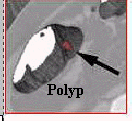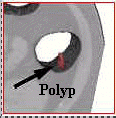

Colon cancer is the second most common cause of cancer related mortality worldwide.
Colorectal cancer develops from polyps. These polyps form when cells lining the colon divide and reproduce in an uncontrolled manner. A form of nuclear division is called Mitosis. However, if a mutation occurs the rate at which the cells divide can no longer be controlled.
These polyps can be cancerous invading the colon wall and surrounding blood vessels and can, potentially, spread to other parts of the body including vital organs such as the liver and lungs.
There are no symptoms associated with the first stages of colon cancer. This is why regular screening is so important.
The exact cause is unclear but can be linked to hereditary and/or environmental factors.
Risk Factors
| Controlled Factors | Non Controlled Factors | ||||
|
|
||||
|
|
Risks can be reduced by :
- Having regular screening checks,
- Maintaining healthy diet high in fruit and vegetables and low in saturated (animal) fats.
Fruit and Vegetables seem to contain substances which interfere with the cancer formation process.
Obesity can increase the risk of cancer of the colon. The risk is greater for people who have excess fat in the waist area compared with those with the same amount of fat in their thighs or hips.
Lack of exercise can increase the risk as active individuals seem to have a decreased risk of developing colon cancer.
Persons who smoke are 50% more likely to die from colorectal cancer than non-smokers.
Men and Women over age 50 are at equal risk of developing colon cancer. Age seems to be a big factor as 90% of the people who develop colorectal cancer are over the age of 50.


